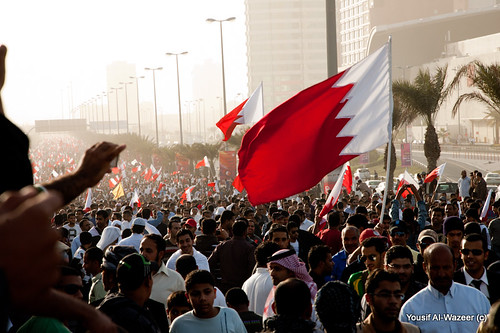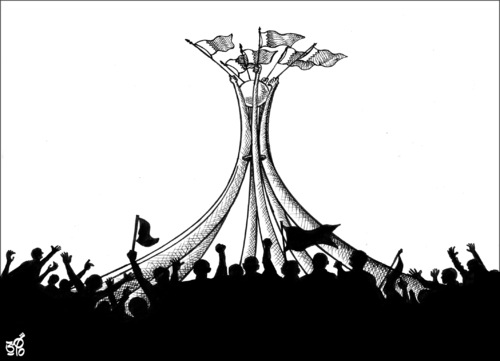
A word on the situation in Bahrain:
Unlike other countries in the Gulf Cooperation Council (GCC), the tiny island of Bahrain is a unique situation in the following ways:
- Bahrain has had a strong national identity for close to a thousand years
- Bahrain is majority Shia'
- Compared to other GCC states, Bahrain has a relatively low number of foreign migrant workers in the labor pool, around ~58% (as opposed to a place like UAE at 90%+)
This means that there is a disillusioned nationalist indigenous solid workforce from which to launch a revolution. Whereas in a place like the UAE suffers from incredible income inequality, exploitation of enslaved labor, and severe political repression, the different languages, nationalities, races, etc of the migrant labor force impedes any united effort to rise up. Bahrain is different in this regard.
Another issue worth mentioning, though it turns my stomach a bit, is that Bahrain is majority Shia' but ruled over by a Sunni family. This leads to sectarian tension, but moreso deepens the suspicions of the people towards the ruling family, which is on good terms with other GCC Sunni kings, and of the ruling family towards the people, who they would accuse as being in he pocket of new GCC favorite great Shaytan: Iran.
There are two major geostrategic interests in Bahrain: it is an hour's drive from the Eastern oil fields in Saudi Arabia and there is a giant US Navy base of operations (USN CENTCOM) and the 5th fleet is stationed there.
Under these conditions, the GCC was very aggressive when it came to helping the ruling Khalifa family crush the revolution. They sent in troops, many of them not even Arab, to shoot unarmed peaceful protestors. They demolished the square where the people had been meeting to protest. They imprisoned thousands of Bahrainis and dumped dead tortured bodies in the streets. They shut down phone service and scoped out facebook looking for protesters to arrest. Even more shocking, there was only one foreign news crew in Bahrain at the time this happened. This is a good documentary about Bahrain recently aired on Al-Jazeera English, taken during this time.
I went to a speech about the "Arab Spring" at the LSE last year and stood up to ask why Bahrain was never talked about. Why is it that Bahrain is unworthy of mention? I think this is why it's important to accept that on one hand, yes, the Arab Spring is legitimate and comes from people's desires to shrug off the yoke of oppression. On the other hand, it is a media narrative that has been utilized to push neoliberal policies in the region. This media narrative is subject to power interests. This explains very well why Bahrain has been "forgotten" ... unlike the Arab states in the maghreb, stability stakes are higher in Bahrain. The GCC is very involved in the discourse and financial work taking place with the Arab Spring throughout the Arabic-speaking world, but when it comes to something so close to their sphere of influence, just an hour drive from Saudi oil fields, they are quick to strike hard and quietly. And the West is quick to keep the silence.
There is currently a human rights activist who is on hunger strike in Bahrain. Today is his 59th day. His name is Abdulhadi al-Khawaja and he was sentenced to life in prison for organizing protests. He has diabetes and has recently been forced onto intravenous feeding. As a dual citizen of Denmark, where he spent decades in political exile, there is speculation that Bahrain will let him go there. This is a recent trend (hunger strikers) and the solution seems to be a spatial fix, shipping the starving prisoners elsewhere. People are still killed and imprisoned in Bahrain on a weekly basis. Yet no one really has a clear idea what is going on - like in all the GCC countries (there was also an uprising in Saudi) it seems very important to the Powers That Be that the message is heavily controlled.
Either way, the Bahraini revolution keeps trudging along, over a year in the making, with very few listening. Bless their hearts. I hope you learned something. Thank you.


